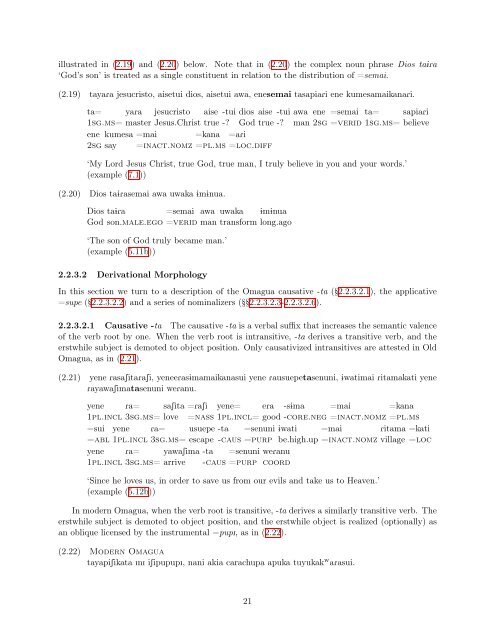draft manuscript - Linguistics - University of California, Berkeley
draft manuscript - Linguistics - University of California, Berkeley
draft manuscript - Linguistics - University of California, Berkeley
Create successful ePaper yourself
Turn your PDF publications into a flip-book with our unique Google optimized e-Paper software.
illustrated in (2.19) and (2.20) below. Note that in (2.20) the complex noun phrase Dios ta1Ra<br />
‘God’s son’ is treated as a single constituent in relation to the distribution <strong>of</strong> =semai.<br />
(2.19) tayaRa jesucristo, aisetui dios, aisetui awa, enesemai tasapiaRi ene kumesamaikanaRi.<br />
ta= yaRa jesucristo aise -tui dios aise -tui awa ene =semai ta= sapiaRi<br />
1sg.ms= master Jesus.Christ true -? God true -? man 2sg =verid 1sg.ms= believe<br />
ene<br />
2sg<br />
kumesa<br />
say<br />
=mai<br />
=inact.nomz<br />
=kana<br />
=pl.ms<br />
=aRi<br />
=loc.diff<br />
‘My Lord Jesus Christ, true God, true man, I truly believe in you and your words.’<br />
(example (7.1))<br />
(2.20) Dios ta1Rasemai awa uwaka 1m1nua.<br />
Dios ta1Ra =semai awa uwaka 1m1nua<br />
God son.male.ego =verid man transform long.ago<br />
‘The son <strong>of</strong> God truly became man.’<br />
(example (5.11b))<br />
2.2.3.2 Derivational Morphology<br />
In this section we turn to a description <strong>of</strong> the Omagua causative -ta (§2.2.3.2.1), the applicative<br />
=supe (§2.2.3.2.2) and a series <strong>of</strong> nominalizers (§§2.2.3.2.3-2.2.3.2.6).<br />
2.2.3.2.1 Causative -ta The causative -ta is a verbal suffix that increases the semantic valence<br />
<strong>of</strong> the verb root by one. When the verb root is intransitive, -ta derives a transitive verb, and the<br />
erstwhile subject is demoted to object position. Only causativized intransitives are attested in Old<br />
Omagua, as in (2.21).<br />
(2.21) yene RasaSitaRaSi, yeneeRas1mamaikanasui yene Rausuepetasenuni, 1watimai Ritamakati yene<br />
RayawaSimatasenuni weRanu.<br />
yene Ra= saSita =RaSi yene= eRa -s1ma =mai =kana<br />
1pl.incl 3sg.ms= love =nass 1pl.incl= good -core.neg =inact.nomz =pl.ms<br />
=sui yene Ra= usuepe -ta =senuni 1wati =mai Ritama =kati<br />
=abl 1pl.incl 3sg.ms= escape -caus =purp be.high.up =inact.nomz village =loc<br />
yene Ra= yawaSima -ta =senuni weRanu<br />
1pl.incl 3sg.ms= arrive -caus =purp coord<br />
‘Since he loves us, in order to save us from our evils and take us to Heaven.’<br />
(example (5.12b))<br />
In modern Omagua, when the verb root is transitive, -ta derives a similarly transitive verb. The<br />
erstwhile subject is demoted to object position, and the erstwhile object is realized (optionally) as<br />
an oblique licensed by the instrumental =pupI, as in (2.22).<br />
(2.22) Modern Omagua<br />
tayapiSikata InI iSipupupI, nani akia carachupa apuka tuyukak w aRasui.<br />
21
















